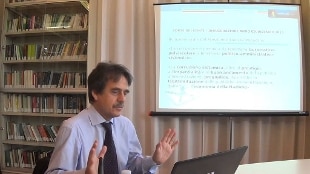- Court of Auditors: doctors on the run, in eight years 9,000 emigrated abroad
- Court of Auditors: the recovery moves away, driven by investments
Share
June 24, 2020The public administration continues to pay late, taking on average 49 days, and the average delay time has increased. This was stated by the coordinating president of the sections gathered during the audit of the Court of Auditors, Ermanno Granelli, speaking at the state report equalization ceremony. "The problem of late payments continues to reappear - the president underlined - despite the efforts made in recent years. The state administration as a whole, during 2019, processed just over 4 million bills for a total amount of about 18 billion and paid 2.7 million corresponding to the amount of about 13 billion. The set of invoices was paid on average in 49 days (47 days in 2018) ".
The average delay time "shows a slight increase from 9 to 11 days and delays accumulate for invoices of a lesser amount. A limited worsening but which also emerges from an overall reduction in the payment capacity that has decreased in the last year of about two points (at 56.8% in 2019) "." Among the causes - added Granelli - the weight deriving from the scarcity of public resources for spending cuts has diminished, there are still both procedural and accounting critical issues, many of which would require the re-engineering of some regulatory processes and interventions. "
High average age of civil servants
"There continues to be a progressive, and now significant, increase in the average age of civil servants, which is greater than 50 years. In this regard, the timely conclusion of the bankruptcy procedures for replacement of staff who have left the service, in order to fill some of the significant gaps that have arisen. In the phase of restarting the hiring process, the issue of enhancing high professional skills is even more central ".
Urgent infrastructure development in the country
"In the current emergency context, fiscal policy is called upon to play a fundamental role". This was stated by the President of the Court of Auditors Angelo Buscema during the State General Reporting Ceremony for the financial year 2019. According to Buscema, a solid infrastructure development in the country "can no longer be postponed" and opportunities may arise from the current phase of smartworking, in particular that of developing networks. The available resources, he underlined, "must be destined to contrast the fragility and disorientation brought about by the economic effects of the crisis, taking into consideration above all those who have been most damaged by this epidemiological emergency. The commitment to return to an environment upset in consolidated behavior , more favorable conditions for the growth and protection of natural resources, is joined by that which is no less relevant and, above all, can no longer be postponed, for the start of a solid infrastructure development in the country: this should be accompanied without delay by a more efficient reorganization of the administrative machinery and fundamental services to be guaranteed to citizenship ". "Precisely from this crisis - adds Buscema - several opportunities emerge that can be seized. I refer above all to the strong impulse that remote work activities - exponentially growing in recent months - can already give to the development of the digital economy and networks; this should not only constitute a stimulus for investments and intangible infrastructures, but also a strong incentive for increasing the overall productivity of the system and reducing existing territorial gaps ".

